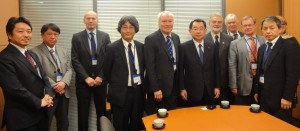
Discussions with the chair of the Federation of Diet members yielded some surprising results. Image: Rika Takahashi, KEK
When the LCC visited the Tohoku region in January, we had an opportunity to see a couple of Diet members and their staff. One of them was very succinct about the problems concerning ILC. He pointed out that the Federation of Diet members to promote a construction of international laboratory for LC boasts more than 20% of the Diet members. And if the ILC would come to the floor, there was no question whether it would pass; that is not the problem, he said. Instead, he saw two other problems.
The first problem is the lack of global political support. The ILC is supposed to be an international project, and Japanese politicians by themselves cannot make it happen. He expressed frustration about not being able to identify counterparts in other nations to work together towards the realisation of the project. We explained that LCC members have been working with funding agencies in respective countries, but it is hard to go beyond that.
At the end of the day, a clear idea emerged. Mr. Ryu Shionoya, the General Director of the Federation will visit Washington DC to meet some of the US policymakers to start conversations about the ILC. He is the No.2 in the hierarchy of Liberal Democratic Party’s Policy Research Council, which is responsible for the policymaking. It is already official and scheduled to be from 30 April to 1 May. A detailed agenda is being put together. It is only the beginning of the conversation, but it needs to start somewhere. I was so impressed by the will of Mr. Shionoya and Federation for the realisation of ILC. I very much hope there will be similar conversations with other countries.
The second problem are the “mixed messages” from the scientific community. We keep talking about various possible future machines or different scientific objectives. It is the nature of us scientists. We speak up freely, express our minds and opinions, argue and debate on just about anything. But from the outside, it is difficult to understand. The timescales under discussions are very different for, say, ILC vs FCC vs muon collider. It is understood within the community, but it is not clear to those who are not part of our community.
I’ve learned that we have to be much more careful in what we say. As the project comes closer to the decision point, inevitably there will be no noise and scrutiny. We as the community need to find a way to stay focused, consistent, and strategically uniform.
Meanwhile, committees under MEXT are doing their work to evaluate both science and feasibility, and I’m hearing that the process is progressing very well. From what I understand, this type of committees is an official undertaking by a governmental ministry, and has a totally different character from the study done by Science Council of Japan, which is completely bottom-up. I was initially worried that having more committees meant a delay tactics, but my friends in Japan tell me that it is not the case. The fact that the government entity is officially engaged in the ILC matter should be viewed as a major progress, they say.
Everything takes time, but I hope eventually things will converge. It is moving forward. And we should use what we scientists are the best at: remain optimistic. Meanwhile, it is not too late to join #mylinearcollider campaign to show your support publicly!


Recent Comments